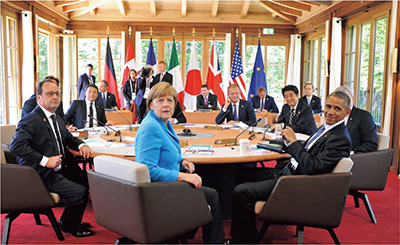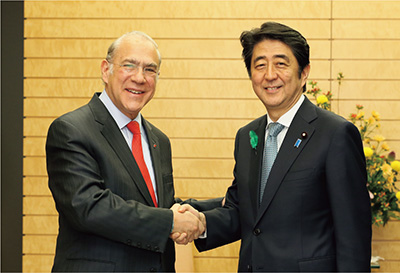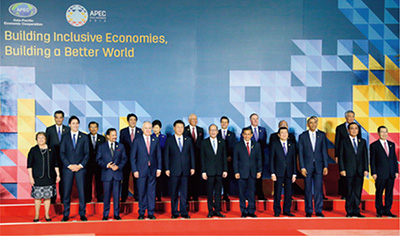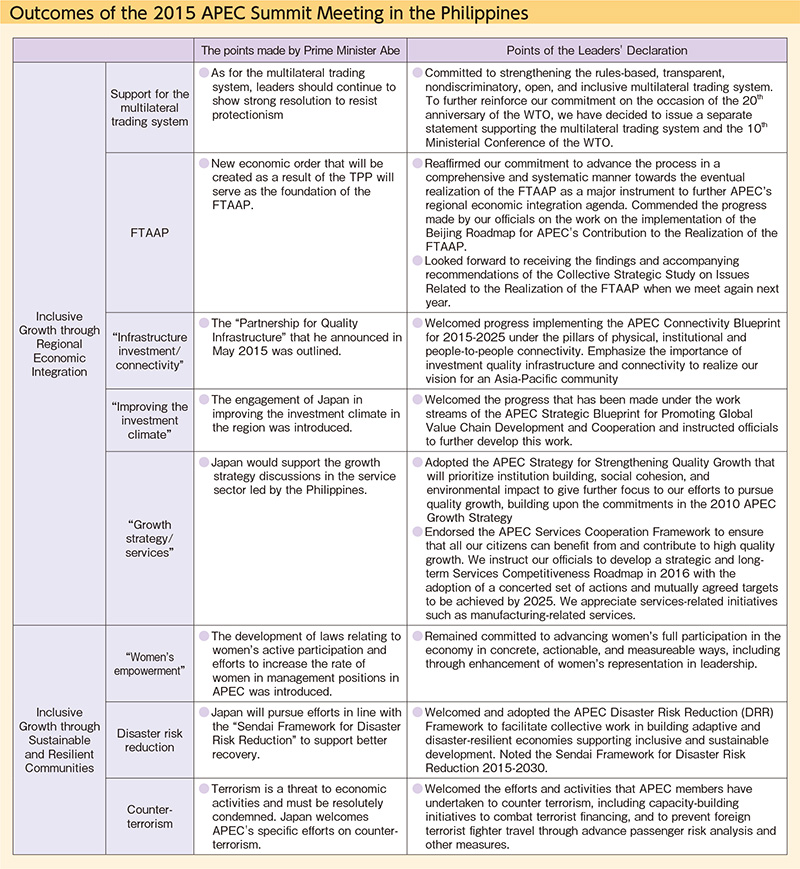Diplomatic Bluebook 2016
Chapter 3
Japan’s Foreign Policy to Promote National and Worldwide Interests
3.Participation in Making International Rules
(1) G7 and G20 Summits
G7 and G20 Summits continue to play an essential role in providing an opportunity to show Japan’s own efforts to the international community and to form a global economic order desirable for Japan.
At the G7 Elmau Summit (in Germany) in June, G7 leaders shared views to uphold freedom, sovereignty and territorial integrity. The year 2015 marked the 70th anniversary since the end of World War II and the 40th anniversary since the first Rambouillet Summit (in France). Prime Minister Abe pointed out the following; the G7 has underpinned the order of the international community, based on the fundamental values such as freedom, democracy, human rights, and the rule of law; the G7 is capable of reacting to challenges from a global perspective, and its responsibility is significant; the solidarity of the G7 is becoming more important. At the summit, leaders had a frank exchange of views on foreign policy centering on Ukraine and Russia, East Asia, and the Middle East as well as the world economy, energy and climate change, and development. Prime Minister Abe mentioned that Abenomics is producing steady results and explained Japan’s future initiatives on the economic and fiscal fronts. Prime Minister Abe also mentioned the “Partnership for Quality Infrastructure” that he had announced in May, and explained Japan’s contributions toward promoting “quality infrastructure investment” worldwide.
As for the situation in East Asia, Prime Minister Abe discussed developments in the rising tensions in the East China Sea and South China Sea such as large scale land reclamation, and pointed out that unilateral actions that seek to change the status quo in the seas must not be overlooked. Additionally, Prime Minister Abe explained that the continuation of North Korea’s nuclear and missile development programs poses a serious threat to both the region and the international community, and sought the cooperation of other countries on the abductions issue, which is a universal issue, as a violation of fundamental human rights.
At the G20 Antalya Summit held in Turkey in November, the leaders exchanged frank opinions concerning specific initiatives for realizing strong, sustainable, and balanced economic growth. The “Antalya Action Plan” was announced, stating the current status and future plans of countries regarding individual macro-economic policies and growth strategies. The leaders strongly condemned the acts of terrorism in Paris, and agreed that the G20 countries will carry out measures against terrorism in a coordinated manner. A “G20 Statement on the Fight against Terrorism” was also issued. With regard to climate change, the leaders shared the view that they will promote the adoption of a new framework “applicable to all parties” at COP21.
 Prime Minister Abe attended the summit
Prime Minister Abe attended the summit(Photo: Office of the Cabinet Public Relations, Cabinet Secretariat)
Prime Minister Abe commented that the G20 countries need to implement comprehensive growth strategies and strengthen initiatives for structural reform, introduced the progress of Abenomics, including promotion of women’s participation in society, and the newly announced “Second Stage” initiatives in particular, and stated his determination to contribute to the growth of the global economy. Furthermore, he mentioned that the TPP agreement, which was agreed to in principle, was at the core of growth strategies, and that he expected that this would lead to growth for Japan by boosting productivity and vitalizing industries, etc. Then, he briefly introduced the progress of the “Partnership for Quality Infrastructure,” and explained that Japan would continue to promote quality infrastructure investments.
(2) World Trade Organization (WTO)
A. History of WTO and Doha Development Agenda Negotiations
The development of the Japanese economy has been largely benefited from the multilateral trading system led by the General Agreement on Tariffs and Trade (GATT) and the World Trade Organization (WTO). Though EPA/FTA negotiations are vigorously conducted, maintaining and enhancing the system is a central pillar of Japanese trade policy toward the revitalization of the Japanese economy, and trade liberalization through WTO negotiations and rule making remain important. However, for more than decades, not all negotiations have made smooth progress. In the WTO Doha Development Agenda (DDA) negotiations11 launched in 2001, the single undertaking of the eight areas (agriculture, non-agricultural market access, services, rules, trade facilitation, development, environment and intellectual property rights) had been pursued. However, since 2008, negotiations have remained deadlocked due to confrontation between emerging and developed countries. At the WTO’s 9th Ministerial Conference (MC9) in December 2013, the “Bali Package,” consisting of the three areas of (i) trade facilitation, (ii) agriculture, and (iii) development, was concluded as a partial agreement of the DDA. While there was some progress, the confrontation between emerging and developed countries remained still deeply and showed that conclusion of DDA negotiations was still long way to achieve.
- 11 DDA stands for Doha Development Agenda
B. The 10th WTO Ministerial Conference (MC10)
At the 10th WTO Ministerial Conference (MC10) held in December, members concluded the ITA expansion negotiations led by Japan as the chair. Though it was the plurilateral agreement, eliminating tariffs on 201 items by 53 countries was expected to bring benefits to all WTO members. With regard to DDA, after the 14 years of negotiations, WTO members agreed on export competition in agriculture including export subsidies etc., which had not been agreed on for many years. These agreements show the WTO’s negotiation function is indeed still working and effective.
Considering the future WTO negotiation function, including whether to continue DDA, was the biggest issues concerned before the conference, however, no concreate decision has been made due to the confrontation among members. The each of eight areas including development covered by DDA remain important, however, it is also necessary to explore new approaches including “up-to-date” issues, in order to revitalize and reinforce the WTO’s negotiation function. Starting in 2016, it is necessary to analyze the reason for not being able to reach an agreement by members and constructively hold discussions.
C. Plurilateral Negotiations
Since the 8th WTO Ministerial Conference in 2011, while the DDA negotiations encountered difficulties, the following negotiations have been made by plurilateraly.
(a) The Information Technology Agreement (ITA) Expansion Negotiations
While implementing the Information Technology Agreement (ITA)12 since 1997, the ITA expansion negotiations were conducted since 2012 with the aim of including newly-developed products13 reflecting technological innovations to the coverage. In July 2015, 201 IT-related products were newly agreed, and the ITA expansion negations were concluded in December through the negotiation of the tariff elimination period. (As of the end of December, 53 countries and regions14 joined the expanded ITA). It is expected that the expansion of product coverage will promote IT trade and enforce economic growth and boosting of productivity through IT.
- 12 Plurilateral framework to eliminate tariffs on IT products (semiconductors, computers, cellular phones, printers, fax, digital still image cameras) (“Ministerial Declaration on Trade in Information Technology Products”). Agreed to in 1996 and executed from 1997. Currently, 82 members including Japan, the U.S., the EU (28 countries), China and Russia are participating.
- 13 Digital audiovisual equipment (camcorders, DVD/HD/BD players), digital multifunction machines and printers, medical equipment (electronic endoscopes, etc.), semiconductor manufacturing equipment, etc.
- 14 Japan, the U.S., the EU, Australia, Canada, China, the ROK, Hong Kong, Taiwan, Singapore, Israel, Turkey, Colombia, Costa Rica, Malaysia, Thailand, the Philippines, New Zealand, Norway, Switzerland, Liechtenstein, Mauritius, Montenegro, Guatemala, Iceland, and Albania (53 members including 28 EU members).
(b) Trade in Services Agreement (TiSA) Negotiations
In order to contribute to further liberalization of services trade, full-scale negotiations on the Trade in Services Agreement (TiSA) have been underway among 50 voluntary countries and regions15 including the U.S., the EU (28 nations), and Australia (as of the end of 2015) since the summer of 2013. The participating countries and regions in the negotiations agree on such points that it should not have a priori exclusion of any sector from the subject of negotiations, and it attempts to upgrade the General Agreement on Trade in Services (GATS), enhancing disciplines to meet the demands through the times. Japan actively participates in the negotiations.
- 15 Japan, the U.S., the EU, Australia, Canada, the ROK, Hong Kong, Taiwan, Pakistan, Israel, Turkey, Mexico, Chile, Columbia, Peru, Costa Rica, Panama, Paraguay, New Zealand, Norway, Switzerland, Iceland, and Liechtenstein (50 members including EU members).
(c) Environmental Goods Agreement (EGA) Negotiation
In July 2014, the Environmental Goods Agreement (EGA) negotiations started. These negotiations are aimed at eliminating tariffs on environmental goods in accordance with the list of environmental goods endorsed by the APEC Leaders in 2012 as well as the commitment made in APEC Leaders’ Declaration in 2013. 45 countries and regions16 have been participating and conducted 11 negotiations. Through these negotiations, it is expected to expand the trade of environmental goods, and to contribute on achieving sustainable development. Japan has actively participated in the negotiations since the launch.
- 16 Japan, the U.S., the EU, Australia, Canada, China, the ROK, Hong Kong, Taiwan, Singapore, Costa Rica, New Zealand, Norway, Switzerland, Israel, Turkey, and Iceland (46 members including 28 EU members).
D. Dispute Settlement (DS)
The WTO dispute settlement system is a quasi-judicial system among the WTO members to resolve trade disputes regarding the WTO Agreements in accordance with the dispute settlement procedures. As a pillar to stabilize and secure predictability in the WTO system, it is functioning effectively. The number of dispute cases from the inauguration of WTO in 1995 to the end of 2015 (the number of requests for consultation) is 501. In recent years, an increasing number of dispute cases and more complex cases increased the burden on the dispute settlement system, and an effective response to this is a big issue.17 Recent cases, in which Japan was involved, are as follows:
○Argentina’s import restrictions18: In January 2015, followed by the Appellate Body report, the WTO Dispute Settlement Body recognized measures by Argentina as inconsistent with the WTO Agreements, and recommended Argentina abide by the WTO Agreement.
○China’s measures imposing anti-dumping duties on high-performance stainless steel seamless tubes from Japan19: In February, a panel report was released to all Members, but some of Japan’s claims were rejected. In May, Japan appealed to the Appellate Body. In October, followed by the Appellate Body Report, the WTO Dispute Settlement Body recognized measures by China as inconsistent with the WTO Agreements, and recommended China abide by the WTO Agreement.
○The ROK’s import bans, testing and certification requirements for radionuclides20: A panel was established in September. The panel procedures are currently in progress.
○Brazil’s measures concerning taxation21: A panel was established in September. The panel procedures are currently in progress.
Japan has contributed significantly toward further improvements to the dispute settlement system, including the clarification of the procedures through DSU22 review negotiations, which are being conducted as part of DDA.
- 17 WTO members that believe that they are suffering disadvantages because of WTO-inconsistent measures by other members, may request consultations between the parties concerned. If a dispute is not resolved through consultations, the member states may refer the issue to a panel and contest the consistency of the measures concerned with the WTO Agreements. A party dissatisfied with a legal finding by the panel may appeal to the Appellate Body, the final adjudicator, to contest the findings. From the establishment of WTO in 1995 until the end of 2015, Japan was involved as a party (either as complainant or respondent) in 36 out of 501 disputes (the number of cases for which requests for consultation were made). The Appellate Body is composed of seven members and the term of members is four years (may be reappointed once). Japan has produced three members since the establishment of the WTO in 1995.
- 18 Japan requested the establishment of a panel in December 2012, concurrently with the EU and the U.S. regarding the case of the requirement for the Advance Sworn Import Declaration, non-automatic import license, and the trade balancing requirements.
- 19 In cases where the export price is lower than the normal value, a product is to be deemed as being dumped and the duty will be imposed up to the dumping margin. Japan requested the establishment of a panel in May 2013. Regarding the case of high-performance stainless steel seamless tubes used in superheaters and reheaters of supercritical and ultra-supercritical boilers in coal-fired power plants.
- 20 The case of import bans, testing and certification requirements for radionuclides introduced by the ROK after the accident at TEPCO’s Fukushima Daiichi Nuclear Power Station in March 2011 and reinforced in September 2013.
- 21 The case of the tax advantage scheme that treats domestic products and exporting countries favorably in the automotive and information and communication technology sectors.
- 22 Understanding on Rules and Procedures Governing the Settlement of Disputes
E. Efforts toward the Elimination and Correction of Protectionism
Since 2008, against the backdrop of such occurrences as the failure of Lehman Brothers and the European debt crisis, an increasing number of countries have introduced protectionist measures. In G7, G20 and APEC, leaders of the participating countries and regions have agreed to continue their efforts to restrain protectionism, and express political commitments accordingly. The WTO has also committed to rolling back protectionist measures through the Trade Policy Review Mechanism and dispute settlement procedures. Japan actively engages in resisting and fighting protectionism.
(3) Organisation for Economic Co-operation and Development (OECD)
A. Features
The OECD is the “world’s largest think tank” covering a wide range of economic and social fields such as macro economy, agriculture, industry, environment, science and technology. The OECD makes policy recommendations and forms international norms through discussions among members at committees and working groups. Japan acceded to the OECD as the first non-European and non-American country, in 1964 the same year it hosted the summer Olympic Games in Tokyo. Since then Japan has been actively engaged in the OECD through discussions at committees and working groups as well as through contributions in terms of financial and human resources.
B. Strengthening the Relationship with Asia
In view of the increasing importance of Southeast Asia as a world economic growth center, the OECD is focusing on strengthening the relationship with that region. At the Ministerial Council Meeting chaired by Japan and attended by Prime Minister Abe in 2014, which marked the 50th anniversary of Japan’s accession to the OECD, the “Southeast Asia Regional Programme” was launched. Additionally, Japan actively continues to act as a bridge and to contribute to strengthening the relationship between the OECD and Southeast Asia, including by holding the first steering group meeting in Jakarta, Indonesia in March 2015 and becoming a co-chair with Indonesia, a representative of ASEAN.
 Mr. Angel Gurria, Secretary General, OECD visiting Prime Minister Abe
Mr. Angel Gurria, Secretary General, OECD visiting Prime Minister Abe(April 15, Photo: Office of the Cabinet Public Relations, Cabinet Secretariat)
C. The 2015 OECD Ministerial Council Meeting
The OECD Ministerial Council Meeting chaired by the Netherlands was held in June 2015 under the theme of “Unlocking Investment for Sustainable Growth and Jobs.” With COP21 and the UN summits concerning the “2030 Agenda for Sustainable Development” in mind, Japan pointed out the importance of “quality infrastructure investment” in development while underlining the contributions by Japan related to climate change again. In addition, many countries expressed support for the promotion of the “Southeast Asia Regional Programme.” At the 2016 OECD Ministerial Council Meeting chaired by Chile, Japan will serve as a vice chairman with Hungary and Finland.
D. Initiatives in Various Sectors
In recent years, multinational companies, which are engaged in taxable economic activities, reduce their tax burdens by exploiting international tax loopholes. This problem has become evident. To resolve this, OECD’s Committee on Fiscal Affairs (CFA), led by a Japanese chairman, launched the Base Erosion and Profit Shifting (BEPS) project in 2012 and the “BEPS Action Plan” in 2013. The final report was released as a result of this action plan in October 2015. Japan actively participates in discussions in fora such as the OECD, and leads international efforts on taxation.
E. Contributions in Terms of Financial and Human Resources
Japan was the second biggest financial contributor to the OECD after the U.S. in 2015, covering 11.92 % of the OECD’s mandatory contributions (Part I Budget). Moreover, Japanese nationals have successively served as the Deputy Secretary General, the number 2 post of the OECD Secretariat. Japan has supported the OECD through such contributions in terms of financial and human resources.
(4) Asia-Pacific Economic Cooperation (APEC)
APEC is a forum that aims at sustainable development in the Asia Pacific region on a voluntary basis by each individual 21 economies23 in order to promote regional economic integration and cooperation. APEC consists of 21 countries and regions (economies) in the Asia-Pacific region, which is a “world growth center” with about 40% of the world population, about 60% of the world GDP, and 50% of the trade volume. Regional trade accounts for about two-thirds of the total trade, being comparable with the EU in terms of establishing a close regional economy. Strengthening economic cooperation and trust relationships in the APEC region is extremely important in pursuing Japan’s further development. APEC Economic Leaders’ Meetings and Ministerial Meetings provide the member economies with significant opportunities to exchange frank views among leaders and ministers regarding major interests in the international community, specifically focused on various economic issues.
 APEC Economic Leaders’ Meeting in the Philippines
APEC Economic Leaders’ Meeting in the Philippines(November 18-19, Manila, the Philippines, Photo: Office of the Cabinet Public Relations, Cabinet Secretariat)
At the APEC Philippines 2015 hosted by the Philippines, under the theme of “Building Inclusive Economies, Building a Better World,” the following four priorities were established: (1) “promoting the regional economic integration agenda,” (2) “fostering SME participation in regional & global markets,” (3) “investing in human capital development,” and (4) “building sustainable and resilient communities.” At the APEC Economic Leaders’ Meeting held in Manila in November, vigorous discussions took place under the themes of “Inclusive Growth through Regional Economic Integration” and “Inclusive Growth through Sustainable and Resilient Communities.” As outcomes of the meeting, the “APEC Economic Leaders’ Declaration – Building Inclusive Economies, Building a Better World: A Vision for an Asia-Pacific Community,” and as its annexes, “APEC Strategy for Strengthening Quality Growth” and “APEC Services Cooperation Framework” were adopted, and “Statement on Supporting the Multilateral Trading System and the 10th WTO Ministerial Conference (MC10)” was released.
At the session on “Inclusive Growth through Regional Economic Integration,” Prime Minister Abe stressed the importance of “strengthening the rule of law in the economic field” for high quality growth and prosperity. He also explained Japan’s specific efforts inside and outside of APEC such as to support for the multilateral trading system, TPP and the Free Trade Area of the Asia-Pacific (FTAAP), improvement of the investment climate, enhancement of regional connectivity including maritime connectivity and quality infrastructure investment. Additionally, at the session on “Inclusive Growth through Sustainable and Resilient Communities,” he explained the initiatives that Japan emphasizes in pursuing economic growth and quality growth at the second stage of Abenomics, such as the “Society with the Dynamic Engagement of All Citizens” and women’s empowerment and expressed the intention to actively contribute to emergency measures, enhancing the quality of electric power infrastructure and counter-terrorism.
Peru will be the host country in 2016.

- 23 APEC participating units including Hong Kong China and Taiwan
